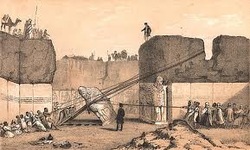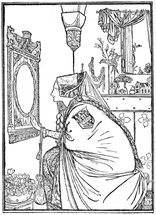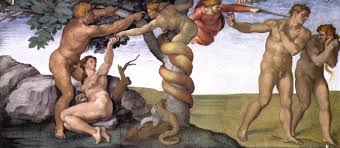
British explorers looting Iraqi sculptures in the 1850's
I like to take a famous story that everyone's familiar with and give it a new twist. When I set out out to write The Witch of Babylon, I started exploring the familiar stories in the Book of Genesis. I quickly learned many of these were re-tellings of Mesopotamian myths, began to research Mesopotamian history and fell in love with the culture. Just as I became engrossed with accounts of the sacking and destruction of the great cities of Ur and Nineveh, the Iraq War broke out. Live on CNN, I watched the looting of the Iraq National Museum and the destruction of Baghdad. It was as if history had come full circle. Out of that experience, The Witch of Babylon was born. It's the story of Turkish-American John Madison, a New York art dealer who's caught between his elder brother's obsession with saving an ancient engraving and a deadly game staged by a childhood friend. To evade his enemies, Madison must solve the prime riddle of alchemy: Is it really possible to convert lead into gold? His quest lays bare a 2,600 year old conspiracy to hide a fabulous treasure and the truth behind a famous story the world believes is only a myth.

In the Book of Stolen Tales, Madison again finds himself on the hunt, this time for a rare book - the first European anthology of fairy tales. It's stolen by a strange thief after Madison successfully wins the book at an auction. Under threat from a powerful European nobleman, Madison's journey illuminates the dark origins of these tales stretching back to the Thousand and One Nights and leading him finally to the real site of the Mesopotamian underworld.

In the Angel of Eden, Madison is hired by a famous magician to find a rare sixteenth century book on angel magic and the former assistant who stole it thirty-five years ago. Madison's quest leads him from the great mosques and churches of Istanbul to temples of the ancient Near East, and the great mosques and churches of Istanbul where he discovers the nature of angels and the true location of the Garden of Eden. Here's an excerpt:
Yeva fed and watered the sheep and herded the brown hens into their coops for the night. When only soft rustlings and clucks could be heard she breathed deeply and closed the latch. Sweat slipped down her back and gathered in the curve at her tailbone. Damp spots showed on her dress underneath her arms and around
her waist. She fumbled with the dusty serape wrapped around the infant in an effort to conceal the mark near his jaw. The baby’s rosy cheeks puffed as he let out a breath. She touched his forehead lightly and he smiled in his sleep.
He is a good boy, no matter what they say.
To the east, the cloudless sky grew dark on the horizon. A pale sphere of moon hung like an ancient coin suspended between heaven and earth. A chorus of crickets sang from the high cliffs. The waning sun turned the tops of the sparse cedars to copper.
All spoke of a peace she did not feel.
With the animals tended, she’d run out of excuses to stay outside. She had to go in now and face her father. Surely the whispers she’d heard earlier were false. Had the village men not already exacted a terrible price? Did they want even more vengeance? Yeva thought of the strange book and shuddered. She’d chosen the hiding place carefully. Prayed it would stay concealed.
A blast of hot air met her as she pushed open the wooden door to the old stone building. The house had sheltered her family for generations, just how far back no one knew. Its very walls were a part of her. Despite the sweltering day, fire roared in the old iron stove; its metal casing glowed amber in the darkened room. The home’s few windows were closed, turning the space into a hot, dry cavern. Candles illuminated her father standing by the stove. His shoulders were hunched, his arthritic hands crooked from years of outdoor work, his skin the color of old leather. “You’re late,” he said, without turning to her.
She replied softly in the flickering gloom. “The baby slows me down, Papa. It takes longer to finish my tasks.”
Her father cast a furtive glance at the bundle she held close. He’s afraid of his own blood, Yeva thought.
He looked away and put an old enamel kettle on the stove. It hissed and sputtered. “They are coming tonight, Yeva. You must leave. You should have gone already.”
“I can’t part with you, Papa!”
He shook his head sadly and brushed his hand over his brow. “You will go tonight, Yeva. They killed that man in front of my eyes. Do you need any more proof?”
He picked up a small cloth bag from the table and held it out. He did not take a step toward her and still refused to meet her gaze. “Your brother is waiting with the horse behind the house; Alaz is impatient to leave. And your sister packed a few things. Food, enough for several days. She will take the mountain trail and meet with you as agreed. There is money in here to last you a while. It isn’t much, but it will have to do. My cousin will receive you both in Tabriz. You remember how to reach his house?”
She nodded and took the bag. The child stirred in his slumber as if he felt her apprehension. She whispered, “My life is here, Papa.How can I leave it behind?”
“Only think of the pain in an old man’s heart if he is forced to watch his family die.”
She wanted to embrace him but a slight shake of his head stopped her. He does not want to touch his grandson, she realized.
When he spoke next, his voice was stronger. “Give me the book. When the village men come, I will throw it in the stove and they can see it burn. That may appease them. Where is it?”
Yeva gestured toward a wooden cabinet, the only fine piece of furniture in the small dwelling. “I put it in the space behind the middle drawer.”
Her father walked over to the cabinet, pulled open the drawer, and reached in. He felt in the space and then grasped the old volume, its leather covers battered with wear, its papers tissue-thin and browned. He raised his anxious eyes to hers. “Who would think that simple words inked out on a page could cause so much trouble,words in a language that is not ours, from a country we’ve never seen.” He touched his hand to his lips and held it up to her. The boiling kettle began to squeal. “May God keep you safe, daughter. Now go.”
Yeva rode behind her brother on her father’s Kurdish horse, one arm supporting the baby wrapped in the serape and pressed to her stomach. With her other, she gripped a short plaited rope fixed to the saddle. Alaz kicked the horse’s flanks to hurry it up the hill behind the house. She could smell the musky odor of sheep and grass on her brother’s rough shirt, feel every rise and drop of the mare’s fat rump. The night wind brought with it pungent fragrances of thyme and cedar. Once they approached the river, Yeva chanced a sidelong glance at the ancient cypress tree. Gnarled and misshapen like her father’s hands, hard as iron, it was said to be over a thousand years old. The ground beneath it appeared undisturbed and she uttered a silent prayer. It was a safe hiding place for the real book and well chosen.
Far above her the moon sailed high in the heavens and one bright star shone in the sky.
Yeva fed and watered the sheep and herded the brown hens into their coops for the night. When only soft rustlings and clucks could be heard she breathed deeply and closed the latch. Sweat slipped down her back and gathered in the curve at her tailbone. Damp spots showed on her dress underneath her arms and around
her waist. She fumbled with the dusty serape wrapped around the infant in an effort to conceal the mark near his jaw. The baby’s rosy cheeks puffed as he let out a breath. She touched his forehead lightly and he smiled in his sleep.
He is a good boy, no matter what they say.
To the east, the cloudless sky grew dark on the horizon. A pale sphere of moon hung like an ancient coin suspended between heaven and earth. A chorus of crickets sang from the high cliffs. The waning sun turned the tops of the sparse cedars to copper.
All spoke of a peace she did not feel.
With the animals tended, she’d run out of excuses to stay outside. She had to go in now and face her father. Surely the whispers she’d heard earlier were false. Had the village men not already exacted a terrible price? Did they want even more vengeance? Yeva thought of the strange book and shuddered. She’d chosen the hiding place carefully. Prayed it would stay concealed.
A blast of hot air met her as she pushed open the wooden door to the old stone building. The house had sheltered her family for generations, just how far back no one knew. Its very walls were a part of her. Despite the sweltering day, fire roared in the old iron stove; its metal casing glowed amber in the darkened room. The home’s few windows were closed, turning the space into a hot, dry cavern. Candles illuminated her father standing by the stove. His shoulders were hunched, his arthritic hands crooked from years of outdoor work, his skin the color of old leather. “You’re late,” he said, without turning to her.
She replied softly in the flickering gloom. “The baby slows me down, Papa. It takes longer to finish my tasks.”
Her father cast a furtive glance at the bundle she held close. He’s afraid of his own blood, Yeva thought.
He looked away and put an old enamel kettle on the stove. It hissed and sputtered. “They are coming tonight, Yeva. You must leave. You should have gone already.”
“I can’t part with you, Papa!”
He shook his head sadly and brushed his hand over his brow. “You will go tonight, Yeva. They killed that man in front of my eyes. Do you need any more proof?”
He picked up a small cloth bag from the table and held it out. He did not take a step toward her and still refused to meet her gaze. “Your brother is waiting with the horse behind the house; Alaz is impatient to leave. And your sister packed a few things. Food, enough for several days. She will take the mountain trail and meet with you as agreed. There is money in here to last you a while. It isn’t much, but it will have to do. My cousin will receive you both in Tabriz. You remember how to reach his house?”
She nodded and took the bag. The child stirred in his slumber as if he felt her apprehension. She whispered, “My life is here, Papa.How can I leave it behind?”
“Only think of the pain in an old man’s heart if he is forced to watch his family die.”
She wanted to embrace him but a slight shake of his head stopped her. He does not want to touch his grandson, she realized.
When he spoke next, his voice was stronger. “Give me the book. When the village men come, I will throw it in the stove and they can see it burn. That may appease them. Where is it?”
Yeva gestured toward a wooden cabinet, the only fine piece of furniture in the small dwelling. “I put it in the space behind the middle drawer.”
Her father walked over to the cabinet, pulled open the drawer, and reached in. He felt in the space and then grasped the old volume, its leather covers battered with wear, its papers tissue-thin and browned. He raised his anxious eyes to hers. “Who would think that simple words inked out on a page could cause so much trouble,words in a language that is not ours, from a country we’ve never seen.” He touched his hand to his lips and held it up to her. The boiling kettle began to squeal. “May God keep you safe, daughter. Now go.”
Yeva rode behind her brother on her father’s Kurdish horse, one arm supporting the baby wrapped in the serape and pressed to her stomach. With her other, she gripped a short plaited rope fixed to the saddle. Alaz kicked the horse’s flanks to hurry it up the hill behind the house. She could smell the musky odor of sheep and grass on her brother’s rough shirt, feel every rise and drop of the mare’s fat rump. The night wind brought with it pungent fragrances of thyme and cedar. Once they approached the river, Yeva chanced a sidelong glance at the ancient cypress tree. Gnarled and misshapen like her father’s hands, hard as iron, it was said to be over a thousand years old. The ground beneath it appeared undisturbed and she uttered a silent prayer. It was a safe hiding place for the real book and well chosen.
Far above her the moon sailed high in the heavens and one bright star shone in the sky.
